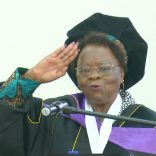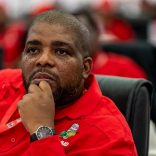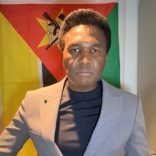Mozambique: Leader of the CAD coalition, which supported Mondlane, to turn himself in - Watch
Maputo again asks for South Africa to extradite Manuel Chang – Lusa

File photo: Lusa
The Mozambican government has again asked the South African Minister of Justice to extradite Manuel Chang, days after announcing that it was withdrawing legal appeals relating to the case.
The Mozambican Attorney General’s Office (PGR) announced on February 10 that “the withdrawal of the two appeals will help speed up the outcome of the case”, and that “the additional grounds presented, through the appropriate channels, support the [South African] Minister of Justice in the re-analysis of the request” for the extradition of the former Mozambican finance minister.
Then, in a document dated 17 February and sent to the Minister of Justice of South Africa, Ronald Lamola, the Mozambican PGR again requested the extradition of the former minister, stating that “Mozambique has sufficient evidence to condemn [Manuel] Chang and his co-accused”, and listing a total of 20 people.
“Chang is a central figure in the two cases in which he is facing charges. The Attorney General’s Office has attached Chang’s US$7 million in funds, so the prospects of recovering the embezzled and/or stolen money are very high,” Deputy Attorney General Alberto Paulo says.
The Mozambican PGR argues that the former minister of finance in President Armando Guebuza’s government “is the key” to the conviction of his co-accused in the ‘hidden debts’ case.
“Mozambique believes that the prospect of success in convicting Chang and his co-defendants is high, especially if Chang goes to court in Mozambique,” the PGR’s request reads.
The Mozambican Government confirms in its recent submission to Pretoria that Manuel Chang has not yet been formally accused in Mozambique.
“Due to the fact that Mr. Chang is being detained in South Africa and the need to proceed with the case of his co-conspirators, Mr. Chang’s case was separated and received case number 536/11/P/2019 This is a pending case, awaiting the formal indictment of Mr Chang,” the PGR document notes.
Mozambique first requested the extradition of Manuel Chang through a diplomatic “verbal note” on February 11, 2019, more than six weeks after US justice organs requested, on December 21, 2018, his detention in South Africa and his extradition for trial in a New York court where he has been formally indicted since December 19, 2018. The US extradition request was formalised on January 28, 2018.
Chang, who has been in detention in Johannesburg since December 29, 2018, is accused by the US of fraud, corruption and money laundering in an international fraud totalling some $2.2 billion (around two billion euros).
In the request to South Africa’s Minister Ronald Lamola , Mozambican prosecutor Alberto Paulo underlines that the Mozambican PGR considers that there is a “high probability” that Manuel Chang will be acquitted in the United States of America.
Washington tried one ‘hidden debts’ case at the end of last year and acquitted the main suspect, businessman Jean Boustani, on the grounds that the US court lacked proper jurisdiction.
“The US has failed to condemn Chang’s co-accused, Jean Boustani, although Boustani has admitted to paying bribes to Chang and others. The US is likely to face the same jurisdictional challenges it faced with Boustani,” the Mozambican prosecutor wrote.
Alberto Paulo also argues that, although there is no extradition treaty between Mozambique and the USA, Mozambican judicial authorities recently cooperated in the extradition to the USA of Pakistani citizen Taanveer Ahmed, on January 27, 2020, to be tried by the US Justice for drug trafficking.
“In view of current developments in cooperation between Mozambique and the USA, if Mr Chang were extradited to Mozambique, it is likely that the USA will cooperate in sharing information at its disposal to ensure that Mozambique successfully tries Mr. Chang and his co-accused,” he suggests.
The Mozambican public prosecutor also reiterates in his request that Manuel Chang has stopped enjoying parliamentary immunity in Mozambique since October last year.
“At the time when former [South African justice minister Michael Masutha] made the decision to extradite Chang to the US, Chang was a member of [the Mozambican] parliament. As a member of parliament, Mr. Chang was immune from prosecution without consent of the national parliament. It was based on this immunity that the superior court [of South Africa] considered the decision of the former minister to be illegal and, consequently, irrational,” the PGR emphasised.
“Mozambique is under a new administration resulting from the October 2019 elections. Mr. Chang is no longer a member of parliament. Therefore, Mr. Chang no longer enjoys the immunity offered to a member of parliament,” the document observes.
The Mozambican government further argues that South Africa should take into consideration “the crimes committed in several states”, although “Mozambique is the main [state] affected by the crimes”
“The offenses put Mozambique in a position where it is expected to pay for an obligation in the amount of US$2 billion [€1.842 billion], from which it has not benefited,” Alberto Paulo says.
The Mozambican Deputy Attorney General, in the document sent on behalf of the Mozambican Foreign Affairs Minister Verónica Dlhovo and Attorney General Beatriz Buchili, emphasises that “the poor of Mozambique are the victims of these offenses”.
In addition to Mozambique and the USA, the Budget Monitoring Forum (FMO), a Mozambican civil society platform, has also been involved in the extradition process of Manuel Chang since August 2019.
During the term in office of former South Africa Minister of Justice Michael Masutha, appointed by former president Jacob Zuma, Chang faced two requests for extradition in the context of the ‘hidden debts’ case – from the United States and from Mozambique – at a time when he enjoyed parliamentary immunity .
On July 13, the current South African Minister of Justice Ronald Lamola requested, after his appointment by President Cyril Ramaphosa, that the decision of the former Minister of Justice be analysed and annulled as being contrary to the provisions of South African Extradition Law and the SADC (Southern African Development Community) extradition protocol.













Leave a Reply
Be the First to Comment!
You must be logged in to post a comment.
You must be logged in to post a comment.